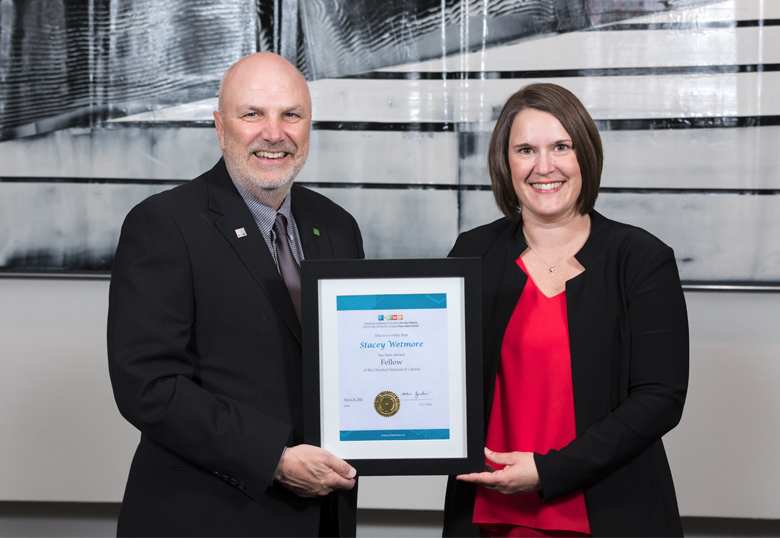In a first for the University of Lethbridge, Dr. Stacey Wetmore has been awarded a Chemical Institute of Canada (CIC) Fellowship, the highest accolade that can be bestowed upon a CIC member.
“It’s a huge honour; I’m still in shock,” says Wetmore, a faculty member in the Department of Chemistry & Biochemistry with expertise in computational chemistry. “I really wasn’t expecting to be awarded with that at this point in my career. Normally, it’s something that people receive in the later parts of their careers because it’s really a career-distinction type of award.”

The award recognizes individuals for making exceptional contributions to the chemical professions.
“Fellowship in the CIC is awarded to those members of the Canadian Society for Chemistry, the Canadian Society (CSC) for Chemical Engineering and the Canadian Society for Chemical Technology who have made outstanding scientific, engineering or technical contributions, including service, management and teaching,” says Dr. Neil Burford, chair of the CIC. “Professor Wetmore is highly deserving of this honour which recognizes her outstanding achievements as a researcher and mentor and for her work with the CSC, the CIC, NSERC and the Canadian Journal of Chemistry.”
Wetmore came upon the field of computational chemistry somewhat by chance. She was attending Mount Allison University in New Brunswick, studying math and chemistry in a combined honours program.
“After my second year, I spent a summer doing math research and, after my third year, I spent a summer doing chemistry research in a wet lab,” she says. “Both of those experiences taught me what I didn’t want to do. Then we had a speaker come to the university and talk about how you can do chemistry by computer. You needed to understand math and be able to work with computers to model what was actually happening with the molecules and look at how they react together. I thought this sounded like something that played to my strengths and interests.”
The guest speaker was Dr. Russell Boyd. Wetmore went on to complete a PhD at Dalhousie under his supervision and now, some 17 years later, he nominated her for the CIC fellowship.
"Stacey has an inimitable level of enthusiasm that she applies to everything she does, be it teaching, research or administrative activities,” says Boyd, professor emeritus at Dalhousie University. “Her students have no choice but to be inspired by her enthusiasm and respond in kind. She has become an outstanding researcher through her willingness to tackle tough problems, to master complex material, and to persevere in a minefield of potential blind alleys."
After doing a post-doctoral fellowship at the Australian National University, Wetmore joined the faculty at her alma mater. As a student, she had been involved in research and, as a professor, she hoped to inspire that same love of research in her students. After five years there, Wetmore came to the U of L in 2006 as a Canada Research Chair.
“I was able, because of our strong liberal undergraduate program, to have undergraduate students participate in research with me,” she says. “We also have a very strong graduate program and two research institutes in our department. That was really appealing. I could do what I loved to do, but I could also extend and expand my research program into new areas by including MSc and PhD students.”
Wetmore, whose research looks at how DNA is damaged and repaired in cells, has had more than 80 undergraduate students and 20 graduate students conduct research in her lab. Her students have also had opportunities to work in labs around the world because of Wetmore’s reputation internationally. She has established research connections during visits to other universities, by attending international conferences and being contacted by other scientists who’ve read about her work in publications.
“The best is when experimentalists read what we’ve done and then come to us and say ‘We see the value in your approach and we want to work with you.’ I think it speaks volumes about the quality of work my students are doing,” she says.
